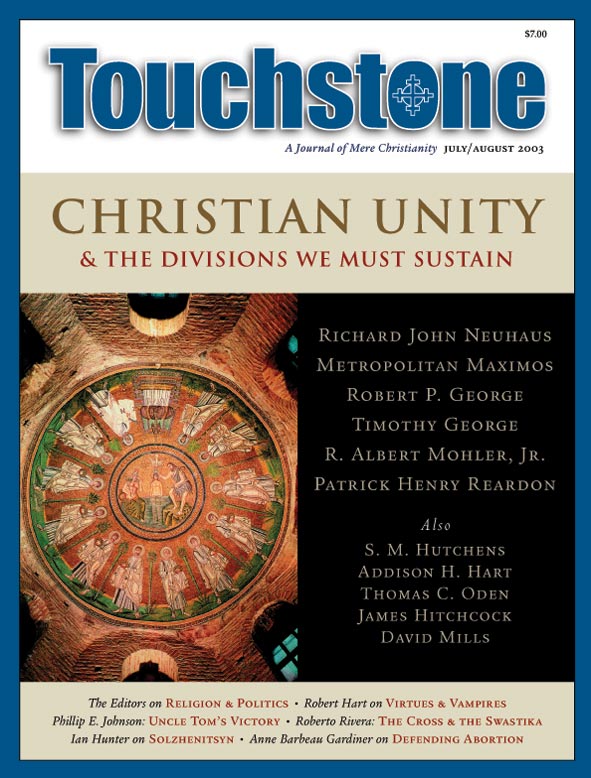Standing Together, Standing Apart
Cultural Co-belligerence Without Theological Compromise
by R. Albert Mohler, Jr.
An ominous sense of urgency surrounds any gathering of those who claim the name of Christ and would dare to speak of eternal things. Darkening shadows and a sense of cultural decline are now settled on the Western Christian conscience with a heaviness of spirit and a tragic sense of loss.
We must not claim that Christianity is the property of Western civilization, but we do acknowledge that Western civilization, such as it is or was, is the product of Christianity and of Christians. Darkness has always loomed in the background, if not in the forefront of Western culture. The critical turning points in Western history were moments when darkness was defeated or dispatched, often just in the nick of time.
Augustine died in 430 as the Vandals were sacking his beloved Hippo. The earthly city would fall, he had warned, but the City of God would remain and stand eternally. Keeping the two cities distinct and clear in the Christian mind has never been easy, but Augustine knew that this distinction is crucial to Christian clear-headedness, and the distinction is irreducibly theological:
One of them, the earthly city, has created for herself such false Gods as she wanted, from any source she chose—even creating them out of men—in order to worship them with sacrifices. The other city, the Heavenly City on pilgrimage in this world, does not create false gods. She herself is the creation of the true God, and she herself is to be his true sacrifice. Nevertheless, both cities alike enjoy the good things, or are afflicted with the adversities of this temporal state, but with a different faith, a different expectation, a different love, until they are separated by a final judgment, and each received her own end, of which there is no end.1
Western civilization now faces a new invasion of the Vandals, and Christians are again confused about the meaning of our current struggle. Theological vandals seek to undermine the Church; political vandals have debased our civic discourse; legal vandals have turned the law into a playground of invented rights; moral vandals entice with a promise of polymorphous perversity; psychological vandals have made every self a victim; and the academic vandals have transformed the university into a circus of irrationality.
We are in danger of forgetting and thus forfeiting the very foundations of our civilization—perhaps even of civilization itself. As T. S. Eliot expressed through the voice of Thomas Beckett,
You shall forget these things, toiling in the household,
You shall remember them, droning by the fire,
When age and forgetfulness sweeten memory
Only like a dream that has often been told
And often been changed in the telling. They will seem unreal.
Human kind cannot bear very much reality.2
Eliot’s Beckett is profoundly right; human kind cannot bear much reality. Christians are, on the other hand, those who claim to be stewards of ultimate reality—a reality more real than anything the earthly city claims as reality. We have no choice but to be the glad bearers and stewards of reality in the midst of a world gone mad. And, as G. K. Chesterton warned almost a century ago, “the most characteristic current philosophies have not only a touch of mania, but a touch of suicidal mania.”3
This suicidal mania is evident in what Pope John Paul II has identified as the “Culture of Death” and a “conspiracy against life.” In his words, “This culture is actively fostered by powerful cultural, economic and political currents which encourage an idea of society excessively concerned with efficiency.”4 Further, “This conspiracy involves not only individuals in their personal, family or group relationships, but goes far beyond, to the point of damaging and distorting, at the international level, relations between peoples and states.”5
R. Albert Mohler, Jr. is president of Southern Baptist Theological Seminary in Louisville, Kentucky (www.sbts.edu). He writes a weblog (www.albertmohler.com) and hosts a daily radio program for the Salem Radio Network.
subscription options
Order
Print/Online Subscription

Get six issues (one year) of Touchstone PLUS full online access including pdf downloads for only $39.95. That's only $3.34 per month!
Order
Online Only
Subscription

Get a one-year full-access subscription to the Touchstone online archives for only $19.95. That's only $1.66 per month!
bulk subscriptions
Order Touchstone subscriptions in bulk and save $10 per sub! Each subscription includes 6 issues of Touchstone plus full online access to touchstonemag.com—including archives, videos, and pdf downloads of recent issues for only $29.95 each! Great for churches or study groups.
Transactions will be processed on a secure server.
more from the online archives
calling all readers
Please Donate
"There are magazines worth reading but few worth saving . . . Touchstone is just such a magazine."
—Alice von Hildebrand
"Here we do not concede one square millimeter of territory to falsehood, folly, contemporary sentimentality, or fashion. We speak the truth, and let God be our judge. . . . Touchstone is the one committedly Christian conservative journal."
—Anthony Esolen, Touchstone senior editor










